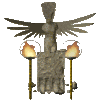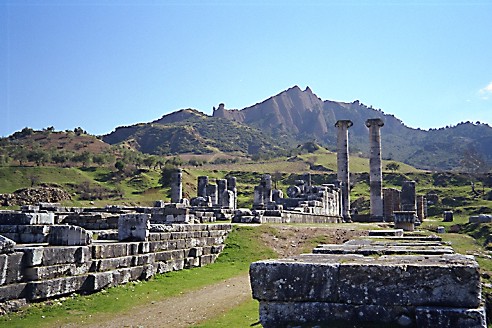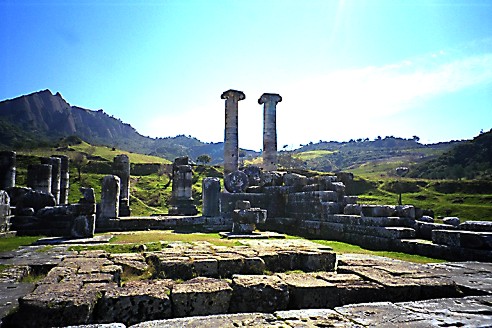|
|
|
 Sardis
Sardis
547-334 B.C.
With the capture of Lydia, and Sardis, by the Persian Cyrus, the Empire of Lydia comes to an end. The Persians establish Sardis as itís western anchor of the vast Persian Empire, and Cyrus begins construction on the Royal Road linking Sardis to Susa, the capital of Persia. A satrap, or governor, is installed on the Sardis acropolis, and the Persian way of life comes to Sardis. Sardis became a major stronghold of the western empire, and the political capital of Asia Minor. Sardis was the political center of control for Lydia, Caria and Ionia. Opulence and luxury are the order of the day, and the craftsmen of Sardis rise to the occasion, supplying all sorts of high-quality goods; cloth with golden threads, perfumes and oils, jewelry using the state of the art techniques. Life was good to Sardis.

Local Lydian aristocrates attempted a coup against the Persian garrison, but this was quickly put down. While the peasantry went along with their daily lives, the aristocrates chaffed under Persian control. The wealth now was being sent to Susa.
Athens meanwhile, stirred up the Ionian neighbors, who attacked Sardis in 449 B.C, with help from underground rebels in Sardis. While the city was burned down, the acropolis held under Artaphernes, until reinforcements arrived. Ionian cities were then subjected to punitive raids and the Persian War was launched against the Greek mainland. It was in retaliation for this uprising that Miletus was destroyed in 449 BCE. The state of war between Persia and Greece existed until in 334 B.C, when Alexander conquered all of Asia Minor, moving on into the Persian Empire and subjecting it too, to the yoke of the Macedonians.

These satraps, while holding great power, were a threat to whichever King reigned in Susa. They also came under threat themselves from other satraps who coveted this great power. For this reason, the Sardianian satrap Oroetes killed satraps Polycrates of Samos and Mitrobaus of Daskylion; then he was himself eliminated on orders from Cyrus the Elder, the King of Persia.
If you have any questions or comments feel free to e-mail me.
Senior Project : 2001-2002 The Great Persian Empire Website